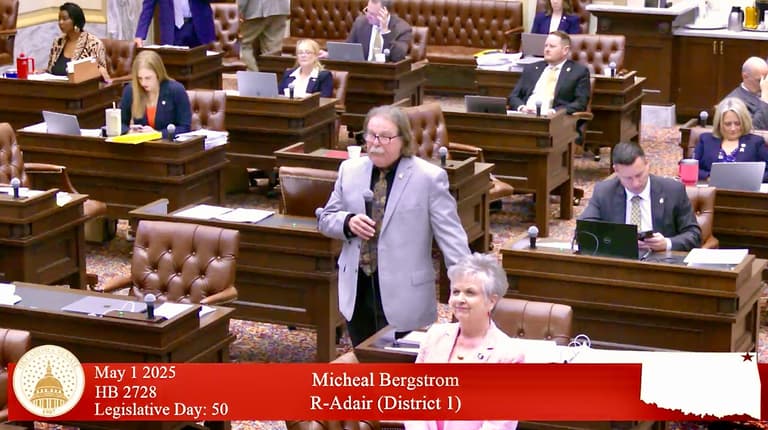
Law & Principles
Ray Carter | May 1, 2025
Measure to rein in regulation clears Oklahoma Senate
Ray Carter
State agency regulations that impose $1 million or more in new compliance costs would get greater scrutiny before taking effect under legislation approved by the Oklahoma Senate.
House Bill 2728, by state Rep. Gerrid Kendrix and state Sen. Micheal Bergstrom, would create the Regulations from the Executive in Need of Scrutiny (REINS) Act of 2025.
Under the bill, the existing Legislative Office of Fiscal Transparency (LOFT) will independently review and assess the economic impact of major rules proposed by state agencies, examining any rule expected to create implementation and compliance costs of more than $1 million over a five-year period.
The Legislature would then have the option to approve or disapprove the proposed agency rules, and major rules generating high compliance costs could not be tied to non-major rules in any joint resolution regarding their approval.
“We have an administrative state that’s the fourth branch of government here.” —State Sen. Micheal Bergstrom (R-Adair)
“We’re 14th in the nation—14th worst in the nation—in regulations, and we’re climbing the wrong way,” said Bergstrom, R-Adair. “We have an administrative state that’s the fourth branch of government here, which is why it’s our job in this building, in this Legislature, in this Senate, to restrain it, to reduce it as much as possible.”
The 2024 edition of “Snapshots of State Regulations,” issued by the Mercatus Center at George Mason University, showed Oklahoma has 142,313 regulations on the books. That’s nearly double the number of regulations imposed in neighboring Kansas.
Although Oklahoma state agencies have produced as many as 500 proposed new rules in a year, Bergstrom said only about eight in the past year would have likely been considered major rules subject to LOFT review under the bill.
Opponents decried the call for regulatory review as part of a big-business conspiracy.
“What I know about the organizations working across the country to reduce regulations in this way, it’s run by big corporations, big money,” said state Sen. Julia Kirt, D-Oklahoma City. “They are trying to undermine the fairness of our state government and the fairness that’s afforded in our laws and our rules to small businesses and to individuals in this state.”
But, contrary to Kirt’s claims, Bergstrom noted that excessive regulation often benefits large corporations by restricting market access from smaller competitors.
“The reality is that the people I’ve heard complain the most about rules—it’s small business,” Bergstrom said. “It’s the folks that don’t have deep pockets to fight against things that are being implemented.”
HB 2728 passed the Oklahoma Senate on a 37-7 vote. State Sen. Jo Anna Dossett, D-Tulsa, joined Republicans in support of the bill. All opponents were Democrats.
HB 2728 now returns to the Oklahoma House of Representatives for consideration of Senate amendments.
Other bills dealing with state agency rules remain alive in the legislative process.
Senate Bill 995, by Bergstrom and Kendrix, would require that all administrative rules be approved through a joint resolution of the Legislature before taking effect. Any rules not explicitly approved would be considered disapproved.
Senate Bill 1024, also by Bergstrom and Kendrix, prohibits the adoption of a proposed rule by an agency unless the agency receives express written approval from the governor or the appropriate cabinet secretary. That bill requires a rule-impact statement to include an analysis of alternatives to adopting the proposed rule and a comparison of any existing or proposed federal regulations that are intended to address the activities regulated by the proposed rule.

Ray Carter
Director, Center for Independent Journalism
Ray Carter is the director of OCPA’s Center for Independent Journalism. He has two decades of experience in journalism and communications. He previously served as senior Capitol reporter for The Journal Record, media director for the Oklahoma House of Representatives, and chief editorial writer at The Oklahoman. As a reporter for The Journal Record, Carter received 12 Carl Rogan Awards in four years—including awards for investigative reporting, general news reporting, feature writing, spot news reporting, business reporting, and sports reporting. While at The Oklahoman, he was the recipient of several awards, including first place in the editorial writing category of the Associated Press/Oklahoma News Executives Carl Rogan Memorial News Excellence Competition for an editorial on the history of racism in the Oklahoma legislature.